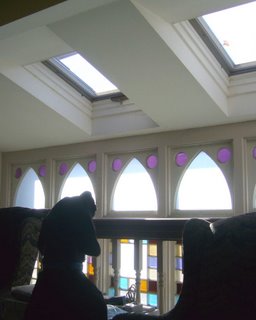Neurotic
 When I got my dog she was six months old, definitely not out of puppyhood. She was very wired; squirrels especially set her off. She was fast enough to catch them, too, except that her spoilsport owner never let her run loose all over the street. The squirrels would dash up a tree and then taunt her while she strained at her leash and barked.
When I got my dog she was six months old, definitely not out of puppyhood. She was very wired; squirrels especially set her off. She was fast enough to catch them, too, except that her spoilsport owner never let her run loose all over the street. The squirrels would dash up a tree and then taunt her while she strained at her leash and barked.Once in a while she'd be in the kitchen or loft and spot a squirrel on the skylight. That would occasion a volley of piercing barks. You don't know temporary insanity till you've been subjected to a prolonged barkfest by an excited cockador.
Tazzy is three years old now--no longer a puppy. She has at least four walks a day, more if her owner is avoiding a deadline, and usually a good run and a ride in the car, too. Ali and Amir tussle with her frequently. Since I work from home, she's almost never left alone. People drop in at all hours, sometimes purely for her amusement. At night, she's got her pick of any bed in the house.
One would think she'd be a pretty well-adjusted dog. Lots of love and attention and exercise; rarely any opportunity for boredom; never any abuse. But lately she's developed a neurotic habit.
It might have started with the squirrels on the skylights. And then an occasional bird landing on the glass. And then a lot of autumn leaves swirling by. And then even more maple keys, striking the panes like little hailstones. She began to notice all the activity on the roof, and bark at it. Even at night, she'd see a reflection in the glass, and bark.
She comes into the kitchen, and for a minute she's fine. Then she'll sneak a quick peek up at the skylight. Then she'll turn her head, and her eye will roll upwards. A soft growl will issue from her throat. And then a low bark. Suddenly her muzzle is pointing to the sky and she's barking nonstop. Think doberman when the burglars come over the wall, and you'll have it.
If she's in the loft, she'll jump onto a chair and put her front paws on the rail. She barks and snarls mightily, but the hostile maple key just keeps asking for more. I have to throw her out of the room before she throws herself over the edge.
I'm not sure how I should handle this problem. I guess I could get rid of the dog. Or have all the instigating maples cut down. Or cover the skylights and do without the light and warmth they bring. Or banish Taz from the wing of the house where I spend almost all of my day. Or take her to a veterinary psychiatrist for therapy sessions.
But what a bunch of sucky alternatives. I think I'll just be patient, and hope her neurotic habit goes away as quickly and mysteriously as it came.
Labels: cockador


